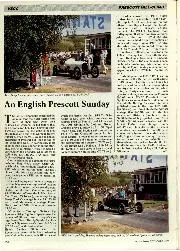
An English Prescott Sunday
The late EKH Karslake expressed the opinion that the older racing cars were at their best when their engines had warmed up but before they had become too hot. That…
ROTARY VALVE*
Sir,
I would like to reply to your correspondent, SiLdr. Carlisle, on the subject of rotary valves.
I fully agree with him on the need to break away from convention and with the advantages he outlines for rotary valves, to which I would add another—the ability of the rotary valve to operate with compression ratios of 12 : 1 on fuel of 70 octane without detonation. In this important respect, the rotary valve is unique, and it is able to take advantage of the fuels with a higher calorific value thus returning an excellent lb./b.h.p./hr. figure.
The problems in the way of its final development are straightforward •and can be divided into two—mechanical and financial. On the mechanical side, the cross proportionate loading system has solved the sealing problem. This is easily applicable to singlecylinder air-cooled engines but becomes more complicated with in-line cylinder arrangements and liquid cooling adds to the difficulty.
On the financial side, very large sums of money have been spent on the sleeve and poppet valves. probably nearly a million a year over a great deal of the last 50 years. and it is quite certain that if a small fraction of this money had been spent on the rotary valve there would be no other form of valve today.
If this money was spent, and the rotary valve developed to the production stage, it would be repaid, not only in the indirect way of national prestige gained from successful racing cars, but also in the form of a decrease in fuel consumption to the millions of those who pay so dearly for their fuel today. I am, Yours, etc., Nfinchinhampton. T. StiERWEN, M. I.Meeh.E. (Late member of the Technical Staff of the Cross Manufacturing Co.)